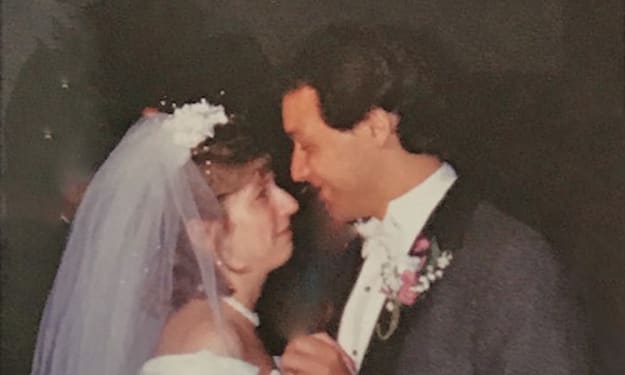What Mental Illness Looks Like
The Roundtable of Broken Voices

The last six months have been a reckoning.
- Reckoning: the settling of an account.
- Reckoning: retribution for one’s actions.
- Reckoning: the art of estimation.
I have been pondering an essay about burnout for awhile now. It’s still a little out of reach, the words and ideas still mostly hazy. But while it’s been hard to describe what burnout feels like in my brain and in my body, its effects and results have been unquestionable:
We can’t continue to do the kind of foster care we’ve been doing.
At least, we can’t do it the way we’ve been doing it, taking teenagers for months at a time until they age out, or burn out, or leave. Right now we’re lying fallow, trying to let some nutrients back into our souls and hoping.
Accepting this reality has been one of the hardest things I’ve ever tried to do. The months since our last kid’s departure have been decidedly less stressful, but my capacity to handle stresses has been shattered.
People who love me are using words like brittle. Reactive. Fragile.
Grieving.
I’m not myself, these days.
I wouldn’t presume to speak to the experience of infertility, since it’s not mine, but I know that it’s excruciating to hear people say, “Just adopt or foster!” when what you really want is to have a kid.
Turns out, that goes both ways.
I really really really want to be a foster parent. I see it as part of my life’s work. I feel it in the way my mother described how it felt to want to have a baby. Putting it in words is difficult: a calling, a desire, a want, a compulsion, a need. It is all of those things, and not quite any of those things.
Foster parenting gives me a deep and abiding connection to the world around me and to people in it. That’s the simplest version I can muster: the kids who’ve come through? I’m tied to them forever. And I want to be. Those ties are tethers, and they are how we survive the world. Your liberation is bound up in mine.
I don’t want to be done with new tethers, new ties.
I don’t want to be done.
But we are.
The last six months have been a reckoning: a careful tally of how we got to this point, all the little ways I fractured over time until things finally broke.
What did breaking look like?
It looked like the end of our last placement. It looked like living between fight and flight, and running on adrenaline for weeks. It looked like not sleeping, not eating, dreading every coming minute and what fresh hell it would bring.
It looked like my inner circle, the people I trust to tell me the truth, all of them, coming to me and saying: you can’t do this anymore. It’s hurting you too much. It’s not good for the kids, or your relationships, or your community. Please. Please, try to see what’s happening. Please listen. This has to stop.
Imagine your closest friends, your family, and trusted people telling you the thing you want most in the world — a thing that gives you purpose and life — is not good for you or for the world.
What does broken look like? Where does this brittleness and fragility come from?
Right now, on your average Tuesday, there is a roundtable in my head. The people at the table include some of the ones who’ve loved me hardest, and some of the ones with whom I’ve fought the most intimately. It’s not everyone you’d think, but probably several.
These phantoms, these lookalikes of people I love, they sit at their table and spit tobacco and recount all the ways I’ve fallen short. My worst fears about myself come tumbling out of their mouths; things the actual person may have once suggested or hinted or said, “Maybe you do this a little sometimes,” come out as <<I always knew you were irredeemable.>>
Someone always wants to know why I couldn’t have just had a baby, because <<don’t I know how happy it would’ve made EVERYONE?>> Someone wants to remind me that <<I only ever did this for attention, and if I really cared about the kids, I’d have never written about them or told anyone about them, and I’m sad about losing my meal ticket to admiration and praise.>>
Someone else just shakes their head at me, slow and disgusted, and sniffs, <<I always knew this was wrong. You should’ve listened to me. But you can’t do that, can you. You can’t listen to anyone. Always has to be your way, no matter what you destroy in the process.>>
In the real world, my love says, “I still like you even though your brain is a jerk,” and the roundtable adds <<but I’m getting real sick of putting up with you like this.>>
The other day, I gave a friend’s teen a driving lesson. I love giving driving lessons, watching a young person negotiate that much power and responsibility for the first time. I keep a cool head and I have some good techniques, and I don’t slam on invisible brakes every time another car’s in sight.
We had an awesome time, the teen and I. They thanked me when it was over, and I left their driveway in the happy glow of new things done well.
The roundtable started once I reached the main road and didn’t let up the whole 20 minutes home: <<Sure, okay. You can do THIS. You can do auntie. You can do mentor. You can do cool driving teacher, friend of mom’s, teacher, general useful adult. But you can’t do foster mom. You can’t do foster mom. You can’t do foster mom. You don’t get to have that. You’re not built for that. You’re not good enough for that. Other people get to have that. Better people. People with more tenacity and grit and heart and stamina.>>
<<People who don’t steamroller their partners with the weight of their parenting dreams and drag them along for the ride without realizing you’ve left them tied to the bumper.>>
Yeah. Those people.
(The voices in my head do not tell me to do things. I know it’s just my brain assigning my worst fears about myself to images of the people I love most. It bears saying that I have no intention or desire to hurt myself or anyone else, and I’m not having trouble intellectually discerning reality from my brain’s little torture exercise.)
I fight with them, sometimes. I see it like a play in my head. Sometimes there’s screaming, and sometimes there’s crying, and sometimes there’s rapid fire argument.
One thing is consistent though: I always lose the fight.
There’s no winning against my brain. And that’s a problem, because it’s really easy to go from,
“Hey, I’m processing this intense and traumatic shift in my life by working it out in my head theatrically,”
to
“I know we haven’t spoken today, but we did just have a really elaborate argument in my head two hours ago in which you told me you could see through all my bullshit and didn’t like what you found, and it’s hard to shake that off, especially since you told me once that you could see the real me, and I assumed immediately that you meant the worst version I keep in my head.”
It’s also really hard to believe the kind things people say out loud when they’ve just spent an hour in your head being ruthlessly cruel. And that’s not fair to them.
It’s also not fair to read the absolute worst into anything they say, but that happens, too. It’s not fair to hear, “I just want you to be happy,” as a fundamental attack on my character, but here we sit.
I thought I knew — not what would make me happy, necessarily, but no one goes into parenting to be happy, right? You go into it because of connection, and the deep and profound satisfaction and occasional joy that comes from being an adult who gets to help raise another human.
Turns out, I did not know. And if I was wrong about that, what else am I wrong about?
Brittle. Fragile. Reactive.
My therapist says I can take control of the roundtable. Redirect it. Take charge of it. Dismiss the participants and send them back to their own brains. She thinks it’s useful that it’s such a concrete metaphor, that I can name all my fears and doubts and dreads.
I ask her: but what if they’re right? What if all these things about me are true, and I just don’t want to face the fact that I’m an egotistical, arrogant, self-serving, destructive narcissist with a martyr complex who lives in a bubble?
Well, she says. Now you know. So they can still go home. Next?
What if I don’t want to?
Don’t want to what?
Don’t want the voices in my head to stop telling me what an awful person I am.
I can see the appeal in continuously torturing yourself, but humor me and tell me why anyway.
Because I’m stuck, and if I get unstuck that means I’ll have accepted the biggest thing in the world that I do not want to be true.
Which is?
I’m not going to be a foster mom for another 30 years. It’s over.
Yes. It is also true that you’ve been a foster mom for six years, which ain’t nothing.
<<On and off>> sneers a member of the round table. <<It’s not like you had kids in your home for six consecutive years. You took a whole year off in the early pandemic, and months between each kid. You get credit for two and a half, MAYBE.>>
I push the voice aside. It’s still the loss of the future I’ve wanted for myself since early adulthood, I tell her. It’s still the thing I thought I could do in the world, the hard thing, the thing not everyone could do, but I could, and it was so needed. And it’s still needed. It’s still having to change the story I tell about myself and who I am in the world.
No one said you don’t get to grieve. But grief is easier when you’re not being constantly berated for grieving.
She gives me a basic exercise for dealing with intrusive thoughts, and I whine about it because I should know how to do this already, and it feels almost condescendingly simple.
You know, she says. It goes a lot faster when you skip the judgment and just do the exercise. Just saying.
It’s not that easy.
Oh, you wanted easy? What’d you call me for?
The people closest to me offer what support they can, while aware that anything they say can trip the wire and land them a place at the roundtable. My therapist suggests pondering why it’s harder to admit that I’m loved and cared for than retreating into a fantasy where everybody hates me and I’m a failure and everything’s my fault.
I would suggest my therapist ponder exiting, preferably pursued by a bear, but I’m too busy crying.
Last week, my love wept as we talked. How can you believe I think things like that about you? I love you. People who love each other don’t see each other that way.
<<People who love each other see each other as they truly are,>> the roundtable explains in exasperation. <<You don’t even know who you are! You thought you were someone who could do this for life, who had the patience and the skill and the bloody constitution for it. But you’re not. So who, exactly, does this person love? And how are you possibly worthy of it? You failed at motherhood! You became the foster parent you never wanted to become. You let it beat you — the trauma, the system, the fear. You lost. You don’t deserve to count yourself among them. You’re not one of the good ones. You never were.>>
I relate the conversation to one of my inner circle, who says I sound like the therapy equivalent of a hostile witness, and I laugh with snot running down my face.
Because it’s not like I’ve spent six months without laughter. Without joy. Without driving lessons and good food and sex and adventure and art. They’re all there. They just have to compete with the roundtable of broken voices, which is the loudest it’s ever been.
I don’t know when it’s going to get better, except that it’ll involve me accepting that this chapter is over and deciding it’s okay to start a new one, to figure out what the future might look like. To start writing the new story I can tell about myself and who I am in the world.
In the meantime, I need patience and more than a little grace. I’m fighting a really really tiring battle in my head, and I’m running low on armor.
About the Creator
Dane BH
By day, I'm a cog in the nonprofit machine, and poet. By night, I'm a creature of the internet. My soul is a grumpy cat who'd rather be sleeping.
Top Story count: 17
Check out my Vocal Spotlight and my Vocal Podcast!
Reader insights
Outstanding
Excellent work. Looking forward to reading more!
Top insights
Heartfelt and relatable
The story invoked strong personal emotions
Easy to read and follow
Well-structured & engaging content
On-point and relevant
Writing reflected the title & theme
Eye opening
Niche topic & fresh perspectives
Compelling and original writing
Creative use of language & vocab
Excellent storytelling
Original narrative & well developed characters
Expert insights and opinions
Arguments were carefully researched and presented
Masterful proofreading
Zero grammar & spelling mistakes







Comments (1)
Tell the "Roundtable" to take a flying fu&k! You're taking in kids, teenagers that have no place to go! You're showing young people what a home and family looks like. Are they doing that$1 Are the members of the "Roundtable" doing that$2 Ummmm....no. Do you have any idea how much you're needed$3 Do you have any clue how much of an impact you're having$4 You're filling in gaps no one could ever fill. You're doing God's work, and I'm A Jewish Atheist who obviously doesn't believe in God. If you need a pause, a break from all the crazy, take it. You're entitled. You can't give to others if you don't first give to you. If it means a break from taking kids, it is what it is, taking them ill-equipped is no service to you or them. I think you're freaking awesome!